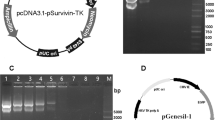Summary
To study the therapeutic effects of herpes simplex virus thymidine kinase (HSV-TK) gene transferred by the EBV-based expression vector (pDR2) on experimental hepatocellular carcinoma, pDR2-TK gene was delivered into human hepatocellular carcinoma cell line SMMC-7721 by using liposome-mediated transfection technique, and then gene expression was detected by RT-PCR, and the killing effects were examined through MTT method. In the nude mice hepatoma model, the antitumor effects of pDR2-TK/GCV system was evaluated in terms of tumor growth. MTT results showed that the pDR2-TK/GCV had cytotoxic effect and about 70% SMMC-7721 cells were killed when GCV was at 1000 μmol/L.In vivo experiment showed that the tumor size in nude mice with transferred pDR2-TK gene was significantly smaller than that in control group (P< 0. 01). On the 10th day the tumor in 3 mice (60 %) disappeared completely after GCV treatment. It is concluded that the pDR2-TK/GCV system has marked killing effects on the experimental hepatocellular carcinoma.
Similar content being viewed by others
References
Qian C, Bilbao R. Bruna Oet al. Induction of sensitive to ganciclovir in human hepatocellular carcinoma cells by adenovirus-mediated gene transfer of herpes simplex virus thymidine kinase. Hepatology, 1995, 22(1): 118
Mosmann T. Rapid colorimetric assay for cellular growth and survival: application to proliferation and cytoxicity assays. J Immunol Methods, 1983, 65(1):55
Kuriyama S, Nakatani T, Masui Ket al. Bystander effect caused by suicide gene expression indicates the feasibility of gene therapy for hepatocellular carcinoma. Hepatology, 1995, 22(6):1838
Touraine R L, Vahanian N, Ramsey W Jet al. Enhancemant of the herpes simplex virus thymidine kinase/ ganciclovir bystander effect and its antitumor efficacyin vivo by pharmacologic manipulation of gap junctions. Hum Gene Ther, 1998, 9(16):2385
Freeman S M, Ramesh R, Marogi A J. Immune system in suicide gene therapy. Lancet, 1997, 349(1):2
hsv-tk EB 1999, 16(3):153
1999, 16(1):40
Author information
Authors and Affiliations
Rights and permissions
About this article
Cite this article
Qingqing, D., Zaide, W., Xiaoping, C. et al. Gene therapy of HSV-TK transferred by the EBV based expression vector on experimental hepatocellular carcinoma. Current Medical Science 21, 122–125 (2001). https://doi.org/10.1007/BF02888074
Received:
Published:
Issue Date:
DOI: https://doi.org/10.1007/BF02888074




